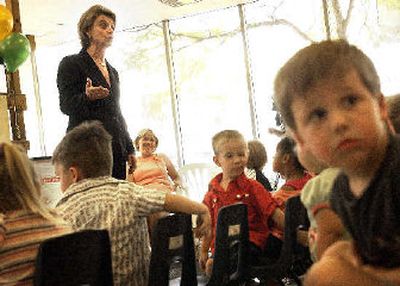Child care earns gold star

Six toddlers sit in little chairs around a table shaped like a half moon. At their caregiver’s request, they stand up one by one, climb two steps to a sink and with her help they wash their hands before returning to their seats.
As she serves them a lunch of sandwiches, broccoli and oranges, she encourages them to say “please” and “no thank you” and tells them “good words” each time they remember to do so.
Social graces are just one of the lessons children learn at the Little Red Schoolhouse Children Center. The center, at 621 W. Sprague Ave., received accreditation from the National Association for the Education of Young Children through a United Way initiative. The accreditation is intended to recognize child-care facilities with programs that meet specific professional standards.
Gov. Christine Gregoire attended a ceremony at the center Thursday to congratulate its staff. Gregoire called it a great model for other child-care centers.
“I think that what you have here is the best in the state,” she told some of the children.
The national association has accredited more than 10,000 child-care facilities nationwide, including 159 in Washington. In addition to the Little Red Schoolhouse, eight other local centers have received accreditation, outside the United Way project.
United Way of Spokane County spearheaded the Early Learning Initiative, which seeks to get child-care centers accredited and to get as many children as possible exposed to high quality early education, initiative Chairman Cliff Lawrence said. Fourteen other child-care centers are seeking accreditation through United Way, and three of them should be accredited this year, Lawrence said
“Poverty in Spokane is so widespread, and it is linked to education,” Lawrence said. Focusing on early education is just one way to tackle the problem and make positive changes, he said.
Accreditation is a rigorous process that can take two to three years. Requirements include having child-care specialists with degrees or certifications and who have an understanding of how children learn. Centers’ physical space and curricula must meet standards designed to enhance children’s learning. Even the federal government has adopted accreditation for its military child-care centers, Lawrence said.
Lawrence said he hopes the project will eventually be taken statewide.
State government has played a role in accreditation efforts: Any center trying to get accredited gets an extra 5 percent for every child who qualifies for government subsidized child-care; those that are accredited get an extra 9 percent, Lawrence said.
Little Red Schoolhouse director Gini Burns, said she has been in the child-care business since 1980. Her center caters to children from ages 6 weeks to 8 years, and has about 110 currently re-enrolled.
Recognition by the national association means “we’re regarded as child-care professionals,” said Burns. “We’re not (just) babysitters.”
At the center, she said, children are taught everything from potty training to getting along with others.
“It’s not a lot of book learning, it’s learning how to learn,” she said.
Rebecca Stolberg, whose 5-year-old son has attended the center since he was six weeks old, said she interviewed nine local day care centers and The Little Red Schoolhouse “had its act together,” outlining its philosophy and curriculum to her at the outset.
“No other place handed me anything,” Stolberg said. “The variety of activities they provide is what my son enjoys.”
She said parents are involved in the center and in helping to set goals for their children.
“I never thought I’d be going to parent-teacher meetings when he was three,” Stolberg said.